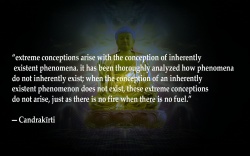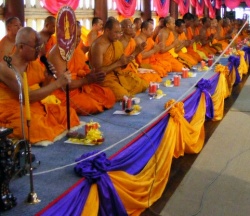Buddhism and sexuality
Buddhist Sexual Ethics
by Winton Higgins
Buddhist Sexual Ethics » A Rejoinder
Religious traditions help us to find our basic orientations in many aspects of our lives. The most important aspect of our lives is how we interact with others. Among other things, this means religions often have a lot to say about sexual ethics. What sexual ethics does Buddhism promote? In this area our tradition speaks more quietly than others, which can leave newcomers wondering if it addresses the subject at all. In fact it speaks quite firmly. In opening up the subject I'll highlight those questions that bear on the issues raised by various liberation movements - by the women's movement, by gays and lesbians, and by the smaller sexual minorities. I don't think I could be too wide off the mark in saying that all these movements whatever else they are about, are engaging with various forms of prejudice, and with violence and violations based on those prejudices.
Prejudices against women and against sexual minorities are usually reinforced by certain standard features of social psychology, such as intolerance of difference and the often deep-seated insecurities of those who regard themselves as 'normal' but aren't quite sure. An important ingredient in this nasty little cocktail, however, is various forms of prejudice, inhibition and repression associated with theistic religious fundamentalism.
Like all religions, Buddhism takes a strong ethical stand in human affairs and sexual behaviour in particular. The most common formulation of Buddhist ethics are the five percepts:
I undertake the training precept of:
1. Refraining from harming living beings/practicing loving kindness
2. Refraining from taking the non-given/praising generosity
3. Refraining from committing sexual misconduct/practising contentment
4. Refraining from false speech/practicing truthful communication
5. Refraining from intoxicants/practicing mindfulness.
These precepts take the form of voluntary, personal undertakings. They are not commandments; there is no god in Buddhism, so none to issue any.
The precepts express basic principles rather than fixed, legalistic rules that any one action falls inside or outside of. Like any non-fundamentalist ethical system, Buddhism provides us with general guiding principles while in no way relieving us of the obligation to make appropriate moral judgements in each morally significant situation we come across. Moral judgement is never a question of blindly applying a rule.
The five precepts constitute an integrated set - each precept supports the others. To know what 'sexual misconduct' means you look at the other precepts. 'Sexual misconduct', in the spirit of the precepts as a job lot, means any sexual conduct involving violence, manipulation or deceit - conduct that therefore leads to suffering and trouble. By contrast good sexual conduct is based on loving kindness, generosity, honesty, and mental and emotional clarity - conduct that has good results.
The third precept about sexual misconduct is strictly superfluous - if in our sexual lives we act non-violently, do not take what is not freely given, do not deceive and do not act out of delusive and irresponsible mind-states, we cannot fall foul of the third precept anyway. Buddhism's very tough sexual ethic would be complete without the third precept. It's really there for the sake of emphasis. Sexuality is a very strong energy, the focus of many cravings, vanities and delusions. It calls for its very own precept! If we have a propensity to make fools of ourselves, to act stupidly and destructively - and we all do have this propensity - then we are likely to manifest it in our sex lives. On the other hand, each of us also has the opposite propensity to act out of friendliness, generosity and wisdom. With moral and meditative training our sex lives can powerfully express this propensity too. Hence the third precept expresses a tough and challenging sexual ethic. Not least for anyone who has grown up male and straight in a society like this one, with all its training in objectifying and predatory attitudes towards women, and deep fears of so-called deviance!
Lets look at the spirit of the precepts as a whole before returning to sexuality. Freedom is the ultimate promise of Buddhist practice - of the moral training as well as the other two great trainings, in mediation and wisdom. Freedom means letting go of the obsessions, compulsions and inhibitions of our psychological conditioning, and so freeing ourselves to respond appropriately in any and every situation. Often freedom takes the form of restraint, the ability to say no to an habitual or received compulsion, craving, fashion or dependency. Sometimes freedom takes the form of saying yes, a yes that overrides habitual or received fears, prejudices and inhibitions.
We can either treat other people and other elements of our environment as objects of our calculation, exploitation and consumption, or we can see other people as we see ourselves. All great religions more or less embody the latter ethic (like the Christian 'golden rule': "do unto others as you would have them do unto you"). Buddhism does so in pure form. The precepts are a training in loving oneself and others, expressed in the intention to act skilfully so as to set us all free. Free from what and to do what? In traditional Buddhist terms, free from bondage, suffering, harm and danger, and free to take responsibility for our own well-being, and to contribute to that of others.
So back to the third precept. In ancient India the precept in its negative form was conventionally read as an injunction against abduction, rape and adultery. It has always carried the additional implication that we honor our sexual undertakings. If we have taken a vow of celibacy we should abstain from sex so long as the vow is on foot. If we have contracted into a monogamous relationship, we only have sex within that relationship. Anything else would be deceitful.
But the precept's ambit, especially today, is obviously much wider and covers violating behaviors that the women's movement among others has rightly politicized. An important example is sexual harassment, so prevalent these days when women and men share public space - workplaces, universities etc. Where power relations are prevalent, the power relations themselves have a gender component, and opportunities and cultural encouragement for abuse are ubiquitous. Among other things, sexual harassment is harming and involves taking the non-given, based on a deep-seated presumption - and delusion - in male conditioning about the constant sexual availability of women.
Rape in marriage is strikingly similar. Also violent and misogynist pornography which creates a hostile and unsafe environment for women and induces moronic and demonic mind-states in men, including delusions about the nature of women and what they want. So both sexes suffer harm. Publication or use of pornography which eroticses women's subordination thus plainly contravenes the third precept. But by no mean all pornography does so, and other sexually explicit material might be equally innocent.
Ethnic Religion and Social Engineering
So far in this account I don't think Buddhism in practice comes to startlingly different conclusions about sexual conduct from those of balanced versions of other major religions. But the other religions also have lists of no-no's, of forbidden sexual practices. Some object to partial or total nudity, or masturbation, or cross-dressing, or sado-masochism, or homosexuality, or fetishism, or premarital sex, or oral, anal or group sex, or contracepted sex. Buddhism is notorious for its habit of putting points of practice and doctrine into lists. So where is Buddhism's list of naughty sexual practices?
The answer is short and sweet. Buddhism doesn't (for once!) have a list. The reason it doesn't have a list is significant. There are two 'pure types' of religion - ethnic ones and universal ones. Ethnic religion seeks to regulate many civic aspects of a particular tribe or people, and especially to regulate the biological and cultural reproduction of the tribe. It thus stipulates all sorts of rules to do with marriage, family, sex roles, bringing up children, etc. Judaism could well stand as a sophisticated example of an ethnic religion.
A universal religion, by contrast, is indifferent to ethnic civic life, transcends cultural particularism, and stands aloof from issues to do with the reproduction of the tribe. One is born into an ethnic religion, but the only real way into a universal religion like Buddhism is by personal conversion. You can convert to a universal religion from any ethnic starting point whatsoever.
Any ethnic religion contains what we might call - in our secular modern mode - a social engineering element. Social engineers, both the religious and the secular ones, make it their business to regulate relations between the sexes so that plenty of babies are born to reproduce and even expand the tribe, and to see that the children are looked after and properly inducted into the folkways and traditional (gender and other) roles of the tribe. Social engineers want to manipulate people so that their sexual energies are channeled into baby-making, and not frittered away on non-procreative sexual activity (what today's media calls 'recreational sex'). A social engineering God or state tends to promulgate laws that criminalize, stigmatize and pathologise non-procreative sex.
Christianity, for instance, is a universal religion in the new testament, but has attached to it many of social engineering elements of an ethnic religion contained in the old testament, which abominates (I gather) such non-procreative activities as adultery, masturbation, sodomy and so on. So Christianity offers a split perspective. Some old testamentarians make careers as the scourges of all non-baby-making sex, its pleasures and its practitioners. At the same time other Christian leaders openly live in lesbian or gay relationships and courageously fly the flag of tolerance. Buddhism is a pure case of universal religion, with no social engineering element. So much so that it does not even have a marriage service. Marriage is a civil matter in Buddhist countries, it has nothing to do with spiritual practice as such. Nor does the Buddhist canon contain a 'holy family' with prescribed sex roles that subordinate women.
If you want to get married in a Buddhist country, the civil authorities provide the appropriate official celebration. Afterwards the bridal couple can go, as many do, to a monastic and ask for her or his blessing, which usually consists in a relaxed word of advice about how to make the match actually work. Ajahn Chah, the great Buddhist meditation master of modern Thailand, had a stream of newly-weds come to his monastery for this purpose. He would tell them: 'You have given your hand in marriage. Your hand has five fingers. Think of them as the five precepts. Practice the precepts in your marriage, and it will be a happy one. That is all you need.'
The Buddha was in fact a social engineer's worst nightmare. Not only did he not waste a word of condemnation on non-procreative sex (hence no list of no-no's), but he inspired thousands to ordain into celibate monasticism and so leave baby-making behind altogether. This was not because he disapproved of sex or babies, but in an era when a non-celibate usually ended up with many children to feed, clothe and house and so had little freedom or time for spiritual pursuits, celibacy made a lot of practical sense for many people with a spiritual urge. Needless to say, the choice is not nearly as stark in developed countries today, where contraception is available and earning a living is a good deal easier.
Buddhism and Tolerance
Buddhism has nothing against sex as such. Practiced skilfully in the spirit of the precepts, it can bring a lot of happiness. As one of my favorite meditation teachers sums it up, there's nothing wrong with dancing lightly with your desires, so long as both can hear the music and all hearts are open. Indeed, I think Buddhism probably improves our sex life in meditation training, where we learn the core skill of mindfulness - of keeping our heart, mind and body in the same place at the same time. So when your body is having a wonderful time with a cuddly friend, your mind is not having a miserable time obsessing about the details of your tax return, for instance - it is free to come to the party too.
Over the years I have gained some familiarity with a number of English-speaking Dhamma centres in western countries, and I'm struck by the unproblematic presence of gays and lesbians in them. In keeping with tradition their sexuality is not an issue and this aspect of their identity is affirmed as straightforwardly as anyone else's. Everyone's structure of sexual desire is unique, and when we leave social engineering considerations behind, there is no warrant for setting one structure of desire above the rest, so long as all can be lived out within the spirit of the precepts.
The appropriate Buddhist attitude to other sexual minorities is just the same. I tested this by visiting the website of Salon Kitty, a very fastidious local establishment which describes itself as 'one of the world's leading BDSM houses.' BDSM stands for bondage, discipline and sado-masochism. On Salon Kitty's main menu is a statement of ethics, which the duty of care and overall responsibility ' the dominant' owes 'the submissive,' not least around the obviously crucial issue of consent. In part the statement of ethics says: Implied in consent is the responsibility of the dominant partner in any BDSM scene to monitor the well-being of the submissive to ensure that the submissive is stable and that the consent is still operative.
It is also the responsibility of the dominant to ensure that the submissive is not consenting to an act that is not in his or her best long-term interests.Neither party should indulge in heavy drinking or drug taking as this can impair judgement…
A description follows of the mechanism for instantly withdrawing consent - the uttering of a pre-agreed 'safe word' - which immediately brings the procedure in question to an end.
Then the statement of ethics resumes: In order to enjoy the possibilities that the world of BDSM offers, one must first discover respect and trust both of oneself and of others. Elements of all five precepts are there, including the last. On the basis of this statement we can conclude that Salon Kitty comes closer to Dhamma than fundamentalist, social engineering killjoys of various religious persuasions!
Conclusion
Buddhism does have a strong sexual ethic, but not a repressive one. The main point of this ethic is non-harming in an area of life where we can do a lot of damage by acting violently, manipulatively or deceitfully. These and breaches of the other precepts - ill will, taking the non-given, lying and stupefaction - are the Buddhist no-no's in sexual practice. Because of its universalistic character, Buddhism as such certainly does not buy into prejudices and inhibitions associated with social engineering, the reproduction of the tribe.
Of course, one can meet Buddhists from traditional backgrounds that do have a problem with non-procreative sex like homosexuality, just as we run into ones that are still challenged by gender equality. But this sort of inhibition or prejudice comes from a particular ethnic culture or national tradition only. You can confidently tell anyone who expresses these sorts of attitudes that they have nothing to do with Dhamma as such.
At the same time each of us has to exercise a personal judgement about how much energy and time we should give over to sex, however skilful our sexual practice. Where does it rank in the inevitably tight order of priorities we have to apply in our busy lives when most of us are struggling to find time to sit daily, get to a regular weekly group sit and to go on retreat? Part of the answer will depend on the moral significance of our commitment to our so-called sexual partner(s). Many people strive to make these commitments and relationships central focuses of moral meaning in their lives, as Ajahn Chah suggests we should. This seems to be the best way to lead an integrated life as a spiritual practitioner and a sexual being.
Winton Higgins





